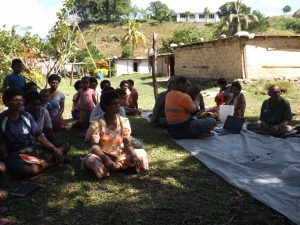
The Fiji National REDD+ Programme has embarked on a series of analytical studies and assessments, to help the country reach “readiness” and implement the Emissions Reduction Program (ERP) in 20 districts in Fiji which will assist in reducing carbon emissions from deforestation and forest degradation before finally engaging in carbon financing.
These studies are comprehensive and cross-cutting – ranging from social issues, to legal instruments and to technical measurements. They include the Monitoring Reporting and Verification (MRV) study, the Feedback and Grievance Redress Mechanism (FGRM), the Drivers of Deforestation and Forest Degradation, the Carbon Rights, the Benefit Sharing Plan and the Strategic Environmental and Social Assessment (SESA).
The SESA study has just been completed and all related documents can now be accessed from the Publications section of the REDD+ Fiji website reddplusfiji.org.
Fiji as a recipient of the Forest Carbon Partnership Facility (FCPF) grant, executed by the World Bank to implement REDD+ (Reducing Emissions from Deforestation and Forest Degradation, forest conservation, sustainable management of forests and carbon stock enhancement) is expected to apply the World Bank’s Safeguard Policies of which the SESA is a significant activity.
SESA is a systematic process for evaluating and addressing the environmental and social consequences of decisions taken when implementing REDD+ strategies and actions. Given these strategies and actions are broad and cross-cutting for instance land use planning. This assessment will contribute to ensuring overall sustainable development by identifying and addressing specific environmental and social risks across various sectors.
In addition, an Environmental and Social Management Framework (ESMF) has also been prepared and includes the following support safeguard instruments – a Resettlement Policy Framework (RPF), and a Process Framework (PF) both of which have been developed to address potential involuntary resettlement and access restriction issues that may occur during the ERP implementation phase.
These also include safeguard measures in relation to Free, Prior and Informed Consultation (FPIC) in the ERP area (20 districts). A Benefit Sharing Plan (BSP) is also under final preparation. These measures are designed to ensure that all Fijians have the same opportunities to derive benefits from the ER Program. A Gender Action Plan (GAP) has also been prepared and aims to promote women participation in the program, share in the benefits, and maximize gender equality.
The main social concerns relate to security of land tenure for agricultural and forest land, access to forest resources improvement to livelihood, and gender issues. The overall ER-P activities are not expected to cause significant negative impacts in terms of loss of access to land or other resources as the general approach of the ER-P is to try to improve access and introduce improvements to sustainable use, and where such restrictions do occur they shall be addressed through the RPF and PF and through safeguards measures.
Through REDD+ implementation it is hoped that this will contribute to building climate resilient communities who will be able to participate and make informed decisions about sustainably managing their forests and to plant more trees which in turn will contribute to less carbon being emitted into the earth’s atmosphere.
Background
Fiji became a participant country in the FCPF in 2013 and a year later in December 2014, the FCPF authorized a grant funding of US$3.8 million to support Fiji’s preparations in engaging in a future REDD+ performance-based system. The grant agreement for the Fiji’s Readiness-Preparation Proposal (R-PP) readiness fund was signed in May 2015. An additional $2million was provided in 2017. This additional funding was to assist the Fiji National REDD+ Programme to carry out more awareness programmes to stakeholders and to strengthen the capacity of existing institutions in the forestry and agriculture related sectors dealing with sustainable land management and sustainable forest management.
-Ends-
For further information please contact Reama Naco, Communications Specialist on email: reama.naco@gmail.com and /or mobile number: +679 9920073.
